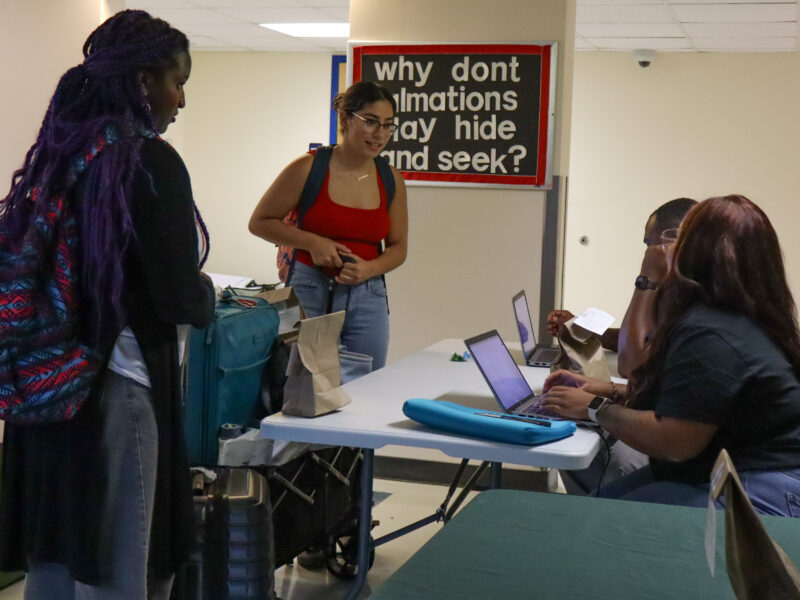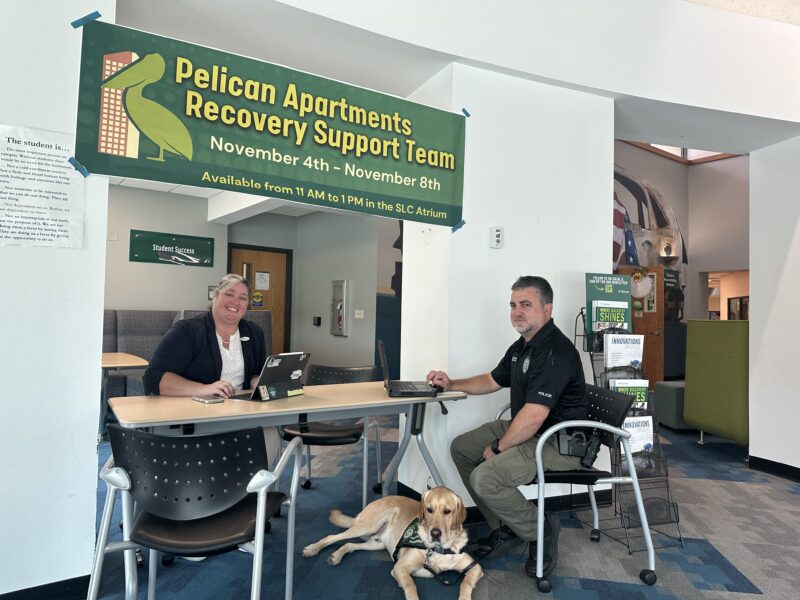Robert La Rocca
Contributing Writer
For Courtney Gale, Deb Wolfe, Donna Winchester and Serena Mercay, it was an opportunity to flex a little journalistic muscle for a good cause.
The 2011 Neuro Film Festival video contest is sponsored by the American Academy of Neurology in order to promote awareness of brain conditions like Neurofibromatosis, or NF.
Gale, a former student with NF2, was asked to enter the contest and thought of Wolfe, her former professor in the journalism department. The video, “A Struggle for Hope,” is the result of the collaboration.
“Luckily, Deb and I think along the same lines,” said Gale, who graduated from USF St. Petersburg in 2008. “From past experience in the class, I knew Deb was very skilled at what she was doing, so I put a lot of trust in her that things would come out perfectly.”
Wolfe had just worked with Gale on closed captioning for the “Dry Creek” western series and considered the timing of the opportunity fortuitous.
“Within three days of my role in the ‘Dry Creek’ series ending, Courtney received a mailing about the film festival,” Wolfe said. “I asked her if she was volunteering to be the subject and she said yes.”
Wolfe tapped students Donna Winchester and Serena Mercay, from the video storytelling class, as crew members. Winchester remembered working with Wolfe at The St. Petersburg Times.
“Deb was a training coordinator and I was an education reporter,” Winchester said. “We hadn’t seen each other for a year and a half. We went to dinner to catch up and she told me all about Courtney.”
Winchester said she was initially concerned about learning a new skill set for composing a video story, but Wolfe’s direction and her own reporter’s instinct helped the story to come together.
“As Deb reminded me, story telling is story telling, regardless of what your medium is,” Winchester said. “Because I already knew how to tell stories for print, I was encouraged.”
“We were constantly talking about how to illustrate the narrative so that it remained objective,” Wolfe said. “I try not to fall into the sympathetic role. Courtney doesn’t want that either. So Donna is our check and balances person.”
Mercay’s primary contributions to the project were story boarding and scripting.
“It was important to all of us that the story was told from Courtney’s perspective,” Mercay said. “Deb works incredibly hard. She really steered the ship. Basically, we collaborated through e-mail and Google Docs. Courtney lives in Boca so we did the prep work virtually.”
Gale’s education in journalism was put to good use as well. Her ability to anticipate questions allowed the interviews to move in unexpected directions.
Winchester says that conducting and transcribing the interview was challenging. She credits Gale’s willpower to stick it through, and says they communicated frequently by writing notes back and forth to one another.
Above all, the goal of the production was to educate viewers about NF2. Although NF1 and NF2 combined affect more people than muscular dystrophy, people are largely unaware of the disease.
Gale and Wolfe put it down to the lack of a famous celebrity spokesperson.
“MS got the attention it currently has mainly because of Jerry Louis,” said Gale. “If it takes a celebrity to make a disease well known, then what exactly are news resources for?”
Gale hopes to attract attention and educate the public about the disease.
According to the Children’s Tumor Foundation, the abbreviation NF represents three separate afflictions—NF1, NF2 and Schwannomatosis. The disease attacks the body by causing tumors to form on the nervous system. NF2 is known for causing deafness.
The slogan of NF2 sufferers is “Never give up. Cure NF2.”
Gale wants people to understand that diseases like MS and NF are not entertainment.
“They are dangerous,” Gale said. “They hurt physically, mentally and emotionally on the family of the patient and the patients themselves.”
Wolfe said that the greater message is that people with medical disorders, mental or physical, are still people like everyone else.
“For doctors to make choices as far as the quality of life for these people is unconscionable,” said Wolfe. “For the general public to react to them in a negative way is just plain rude.”
The slogan for the Neuro Film Festival is “Let’s put our brains together and support brain research.”
And as Gale reminds in the video, “You don’t know what you’re capable of until you try.”
“The video was a great reminder of just why I chose to get into journalism—to tell a story, to reveal things most people are not aware of,” said Gale “I’m probably even more crazy about it now than I was when in decent health.”


